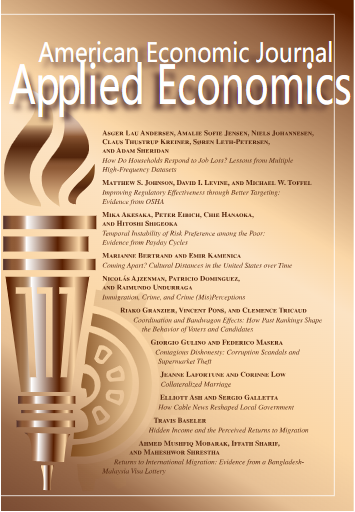理性习惯的形成:来自印度洗手的实验证据
IF 6.2
1区 经济学
Q1 ECONOMICS
引用次数: 0
摘要
我们在印度农村洗手的背景下测试了理性成瘾模型的预测,将其重新定义为理性习惯的形成。为了跟踪洗手情况,我们设计了带有定时传感器的肥皂分配器。我们通过告知一些家庭未来每天洗手的回报变化来测试理性习惯的形成。监督和激励措施同时提高了洗手率,并且在洗手结束后效果会持续很长时间。此外,人们对这种习惯的形成是理性的:当他们预计未来会受到监控时,他们会增加目前的洗手次数。使用肥皂分发器后,所有实验组的儿童平均体重和身高都有所增加。(jel d12, d83, d91, i12, i18, j13, o12)本文章由计算机程序翻译,如有差异,请以英文原文为准。
Rational Habit Formation: Experimental Evidence from Handwashing in India
We test the predictions of the rational addiction model, reconceptualized as rational habit formation, in the context of handwashing in rural India. To track handwashing, we design soap dispensers with timed sensors. We test for rational habit formation by informing some households about a future change in the returns to daily handwashing. Monitoring and incentives raise handwashing contemporaneously, and effects persist well after they end. In addition, people are rational about this habit formation: when they anticipate future monitoring, they increase their current handwashing. Average child weight and height increase for all study arms given soap dispensers. (JEL D12, D83, D91, I12, I18, J13, O12)
求助全文
通过发布文献求助,成功后即可免费获取论文全文。
去求助
来源期刊

American Economic Journal-Applied Economics
ECONOMICS-
CiteScore
9.10
自引率
1.60%
发文量
63
期刊介绍:
American Economic Journal: Applied Economics publishes papers covering a range of topics in applied economics, with a focus on empirical microeconomic issues. In particular, we welcome papers on labor economics, development microeconomics, health, education, demography, empirical corporate finance, empirical studies of trade, and empirical behavioral economics.
 求助内容:
求助内容: 应助结果提醒方式:
应助结果提醒方式:


